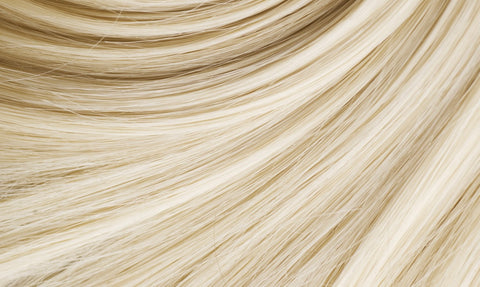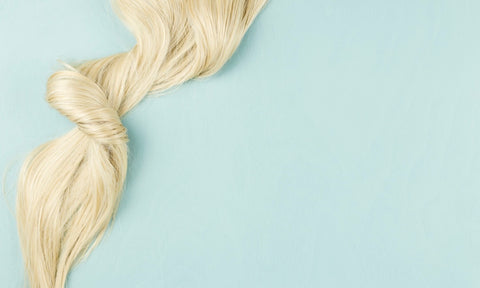What is Hair and How Does it Grow?
Share
What is Hair and How Does it Grow?
I love all things hair - and that starts with the very beginning - what is hair? What is it made of? How does it grow? What is its purpose? These are all key for understanding what products to use and how they work. (Let's be honest I also just find it all very interesting ;)). So let's start with what hair is so we can dig deeper into hair care and all of its complexities.

What Is Hair Made of?
Hair is actually made up mostly of keratin, a protein that is also found in nails and skin. Keratin is what gives hair its strength and structure. In addition to keratin, there are also fatty acids that give our locks their luster and shine - but more on this later! These fats also help protect your strands from sun damage, chemicals, and other environmental stresses.

Hair has a high tensile strength which means it can stretch quite far before breaking - it's actually comparable to the tensile strength of steel (Woah!).
Each hair has three layers: the cuticle, cortex, and medulla. The cuticle is the outermost layer and it's responsible for protecting the cortex and medulla from damage. The cuticle is also what gives hair its shine and luster.
The cortex is the middle layer and it's where all the color and texture lives. This is also where most of the hair's strength comes from. The cortex is the layer that contains keratin.

The medulla fills up about 90% of each strand and is made up of round cells. This part doesn't really serve any purpose other than being your hair's innermost core - think of it as just filler! Some people with very fine hair don't even have a medulla (crazy, right?).
What Does Hair Do?
Hair serves many purposes including protecting our scalp from the sun and other environmental elements and regulating our body temperature.

This one may sound morbid (but I listen to Crime Junkie podcasts way too often) - hair is made up of proteins which are unique to your body, much like fingerprints or DNA! This makes hair's protein composition a very useful tool for law enforcement and other professionals when it comes to forensics. Just another really cool thing that hair can do!
How Does Hair Grow?
Hair grows out of follicles which are tiny pores in the skin or scalp. The bulb (the base) in your follicles is responsible for growing new hair cells. They also contain glands that produce natural oils (sebum) that moisturize the scalp and strand.
The growth cycle of hair goes through three phases: anagen (growth phase), catagen (transitional phase), and telogen (resting phase).

Anagen is the longest phase, usually lasting two to six years. The Anagen phase is when hair grows quickly, about 0.30 mm/day! This is the only time that your strands are alive and growing. During this phase, cells in the follicle divide to produce new hairs.
Catagen is the transitional phase and it only lasts about two or three weeks. This is when hair growth stops and the follicle begins to shrink. The Catagen Phase is when the hair follicle separates from the dermal papilla (the part of the skin that nourishes hair follicles).
Telogen is the resting phase and it usually lasts around three months. This is when hair falls out and new hair starts to grow in its place. The Telogen Phase is when the follicle is completely at rest, the dermal papilla recedes, and a club hair forms.

At any given time about 80/90% of your hairs are in Active (Anagen Phase) while only 10/20% are resting (Telogen Phase).
Most people have about 100,000 hairs on their head and lose anywhere from 50 to 100 strands per day. So don't worry if you see a few stray hairs in your shower drain - it's totally normal!
What Affects Hair Growth?
Many things can affect hair growth. Genetics, of course, play a huge part - some people are born with a predisposition for slow or fast hair growth based on how long they stay in the different growth phases.
Hormones also play a role in hair growth. When estrogen levels decrease (for example, during menopause), hair growth slows down, and your follicles may even shrink in size with an imbalance of estrogen.

Poor diet and nutrition can also lead to poor hair health. If you're not getting the right nutrients, your hair may start to become thin or brittle - the same way your skin and nails suffer when your overall health is not up to par.
Stress can prematurely put your hair into the resting phase causing a noticeable change in your hair thickness/growth.
Age also affects hair growth - as we get older, our hair follicles gradually shrink and produce less oil, which can lead to thinning hair or even baldness.
I've also seen certain medications cause hair loss or slow down hair growth, which is something to be aware of when you start a new medication and to talk to your doctor or pharmacist about.

Wrapping Up
Hair is a complex subject - I didn't even realize how many layers (literally) there are in the anatomy of hair until I studied it in Cosmetology school. I was fascinated by how much there is to the health of hair and how much it helps to understand the ins and outs of hair before trying to tackle taking care of it. I wanted to be sure to have this article up so I can refer to it as we talk about different products and what they do on a more complex level.
There's a lot to learn about hair and how to take care of it, but I hope this gives you a general overview of what hair is, how it grows, and some things that can affect its health. Stay tuned for more posts about specific types of hair products and tips on how to achieve the best possible head of hair!
